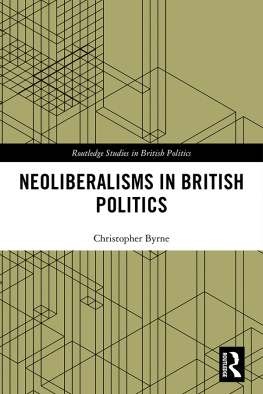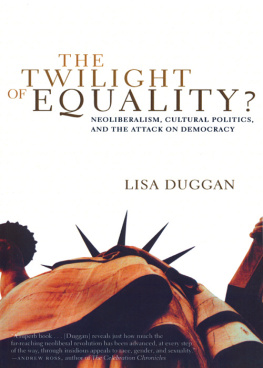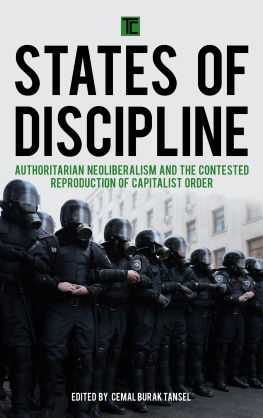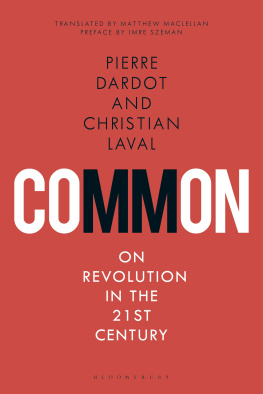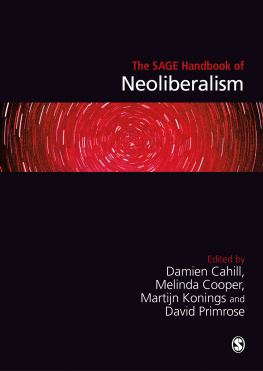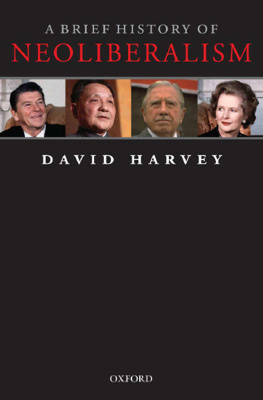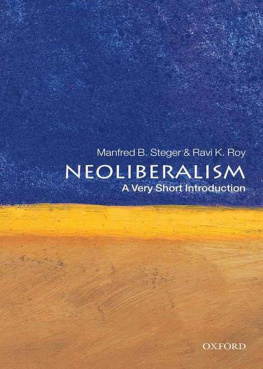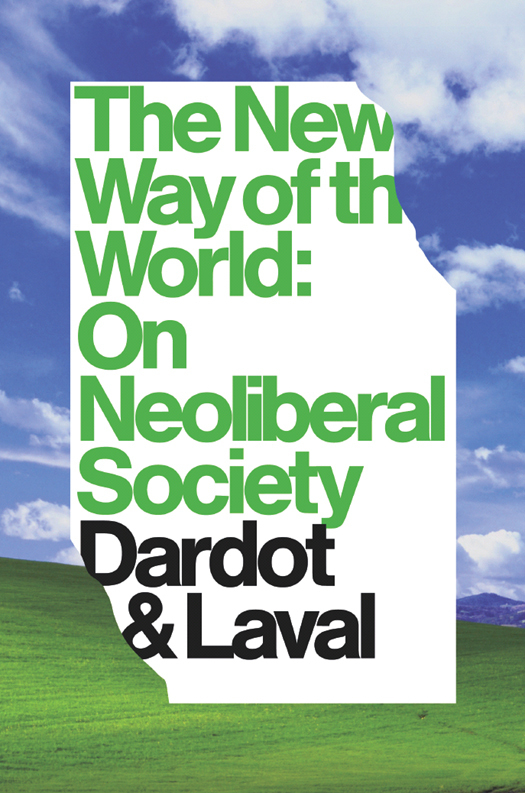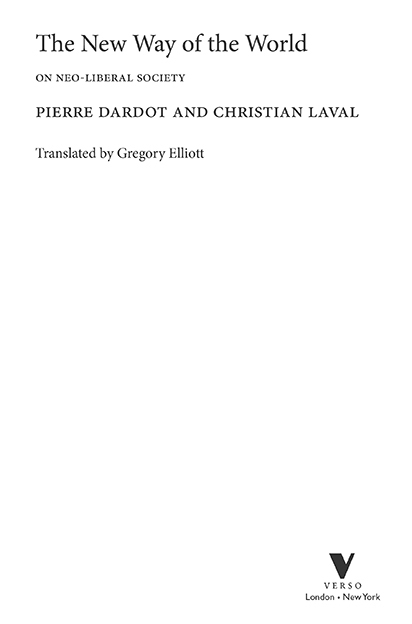This work, published as part of a program providing publication assistance, received financial support from the French Ministry of Foreign Affairs, the Cultural Services of the French Embassy in the United States and FACE (French American Cultural Exchange).
This English-language edition published by Verso 2013
Translation Gregory Elliott 2013
First published as La nouvelle raison du monde: Essai sur la socit nolibrale
La Dcouverte 2009
All rights reserved
The moral rights of the authors have been asserted
Verso
UK: 6 Meard Street, London W1F 0EG
US: 20 Jay Street, Suite 1010, Brooklyn, NY 11201
www.versobooks.com
Verso is the imprint of New Left Books
ISBN-13: 978-1-78168-176-3
ISBN-13 (UK): 978-1-78168-530-3
eBook ISBN: 978-1-78168-221-0
British Library Cataloguing in Publication Data
A catalogue record for this book is available from the British Library.
Library of Congress Cataloging-in-Publication Data
Dardot, Pierre.
[Nouvelle raison du monde. English]
The new way of the world : on neoliberal society /
Pierre Dardot, Christian Laval ; [translated by]
Gregory Elliott.
pages cm
ISBN 978-1-78168-176-3 (hardback)
1. Free enterprise. 2. Liberalism. 3. Capitalism. I.
Laval, Christian. II. Laval, Christian. III. Title.
HB95.D3813 2014
330.122dc23
2013033119
v3.1
Contents
Acknowledgements
In the first instance, this book is indebted to all those who have participated in recent years in the seminar on The Question of Marx, where our research on neo-liberalism was presented and discussed. We are especially grateful to the participants who enriched this collective reflection with their presentations in particular, Gilles Dostaler, Agns Labrousse, Dominique Plihon, Pascal Petit and Isabelle Rochet. We owe much to our editor, Hugues Jallon, who has accompanied the adventure of our seminar since the start and greatly helped us with his advice on the composition of this work. We also thank Bruno Auerbach for his patient and attentive re-reading of the manuscript.
But nothing would have been possible without the loyal friendship and intellectual support of El Mouhoub Mouhoud, who was associated with the writing of this book from the outset; or without the help, as constant as it was precious, of Anne Dardot, who read the manuscript several times and shaped it, without keeping a tally of all her hard work.
Introduction to the English Edition
We have not done with neo-liberalism: such was the opening sentence of the Introduction to the original French edition of this book, published in January 2009. It was a question of dispelling the illusions created by the collapse of Lehman Brothers in September 2008 as rapidly as possible. Many in Europe and the United States thought that the financial crisis had sounded the death knell of neo-liberalism and that the new epoch would see the return of the state and market regulation. Joseph Stiglitz toured the planet announcing the end of neo-liberalism, while leading political figures, like French President Nicolas Sarkozy, announced the rehabilitation of government intervention in the economy.
Dangerous, in as much as they were conducive to political de-mobilization, such illusions did not come as a surprise to us. They were based on a widespread diagnostic error that our book precisely set out to challenge. To get the character of neo-liberalism wrong, to ignore its history, and miss its profound social and subjective springs, was to condemn oneself to blindness and impotence in the face of the developments that soon ensued. Far from impairing neo-liberal policies, the crisis led to their dramatic reinforcement, in the shape of austerity plans put in place by states that were increasingly active in promoting the logic of competition in financial markets. It seemed to us then, and appears even clearer today, that an analysis of the genesis and functioning of neo-liberalism is the precondition for an effective resistance on a European and global scale. While it seeks to conform to the criteria of scholarly research, this book is not academic in the traditional sense of the word, but above all aims to be a work of political clarification of the global normative logic represented by neo-liberalism. In a word, in our view understanding neo-liberalism is a universal strategic issue.
A DIAGNOSTIC ERROR
Since the late 1970s and early 1980s, neo-liberalism has generally been interpreted both as an ideology and as an economic policy directly informed by that ideology. The hard core of the ideology supposedly comprises identification of the market as a natural reality. According to this naturalist ontology, to achieve equilibrium, stability and growth, it suffices to leave this entity to its own devices. Given that any government intervention can only disturb and disrupt the spontaneous process, abstention from it must be encouraged. Thus construed, neo-liberalism is cast as a pure and simple rehabilitation of laissez-faire. As regards its political implementation, from the outset it was analysed very narrowly in Wendy Browns perceptive observation,
as a tool of state economic policy, with the dismantlement of social provision, progressive taxation and other instruments for redistributing wealth, on the one hand, and with the stimulation of the untrammelled activity of capital via deregulation of the health system, labour and the environment, on the other.
When it is conceded that intervention does occur, the latter is construed exclusively as actions whereby the state undermines the bases of its own existence by diminishing the public service obligations previously entrusted to it. A purely negative interventionism, one might say, which is nothing more than the active political aspect of the states organization of its own retreat hence a principled anti-interventionism.
It is not our intention to challenge the existence and diffusion of this ideology, any more than it is a question of denying that it has continued to foster the economic policies massively encouraged since the Reagan and Thatcher years and found its most enthusiastic supporter in the maestro of Wall Street, Alan Greenspan, with the consequences with which we are familiar. But neo-liberalism is far from being reducible to a fanatical act of faith in the naturalness of the market. The profound error made by those who have announced the death of liberalism is to confuse the ideological representation accompanying the implementation of neo-liberal policies with the practical normativity that specifically characterizes neo-liberalism. As a result, the relative discredit surrounding the ideology of laissez-faire today in no way prevents neo-liberalism from prevailing more than ever as a normative system possessed of a certain efficiency that is, the capacity to direct from within the actual practice of governments, enterprises and, in addition to them, millions of people who are not necessarily conscious of the fact. For this is the crux of the matter: how is it that, despite the utterly catastrophic consequences in which neo-liberal policies have resulted, they are increasingly operative, to the extent of pushing states and societies into ever graver political crises and social regression? How is it that such policies have been developed and radicalized for more than thirty years without encountering sufficient resistance to check them?


